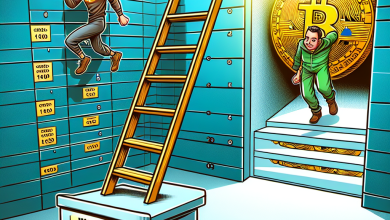Dax on a downward slide: Deutsche Bank shares with a price loss of more than ten percent
Concerns about the banking sector in times of uncertain monetary policy returned with full force on Friday. Renewed price slumps at Commerzbank and Deutsche Bank triggered alarms among investors. Bank stocks also fell outside of Germany.
The price drop at Deutsche Bank was particularly strong compared to other financial institutions. In part, the paper was down 14 percent on Friday afternoon. The shares of the Italian Unicredit and the Swiss UBS, on the other hand, fell by five and seven percent by midday. The reason for the more severe crash in Deutsche Bank shares: The Frankfurt institute is still one of the weaker banks in Europe, so your paper is particularly susceptible to price falls. Commerzbank was now nine percent in the red. At least both stocks were able to make up some ground by the evening. Deutsche Bank closed the trading day with a good eight percent minus, Commerzbank with 5.5 percent.
The price slide of the banks also pulled the leading German index into the red. Our graphic shows the slump clearly:
With the profit-taking, the leading index rounds off a volatile week: First, it fell to its lowest level since the first week of January at 14,458 points, before a rapid recovery to around 15,300 points followed. On Friday it temporarily dropped to a good 14,800 points, then by the evening it was just scratching the 15,000 points again, but was not quite able to reach it (closing price 14,957.23 points).
The MDax with the medium-sized stock market values also fell on Friday, by 2.86 percent to 26,484.15 points. A loss-making start to trading is also evident on Friday on the US stock exchanges: pre-market, all major banks on Wall Street were in the red: JP Morgan, Goldman Sachs, Morgan Stanley and Wells Fargo each fell by two percent, Citigroup almost three percent, Bank of America lost 2.5 percent. The ailing regional bank First Republic Bank rushed another six percent down, the Western Alliance and PacWest slumped by four percent each.
According to traders, the rapid increase in Deutsche Bank CDS, i.e. the credit derivative used to trade default risks, caused unrest at the end of the week. According to the data provider S&P Market Intelligence, more than 200,000 euros had to be paid on Friday to secure a ten million euro package of Deutsche Bank bonds. On Wednesday it was still 142,000 euros.
Good to know:
The abbreviation CDS stands for Credit Default Swaps. The prices for credit default swaps thus represent the prices for hedging against defaults on bank bonds.
Some financial experts still consider Deutsche Bank to be resilient: “We are relatively relaxed about the bank’s robust equity and liquidity positions,” wrote analysts from Autonomous Research in their analysis. “To put it bluntly: Deutsche Bank is not the next Credit Suisse.” Since the emergency rescue of the major Swiss bank Credit Suisse by rival UBS last weekend, many investors have been worried about the crisis of confidence spreading to other financial institutions. CDS from other major financial institutions including UBS, Societe Generale and Intesa Sanpaolo also surged on Friday.
The prices of Deutsche Bank’s equity-like bonds (AT1) also fell, according to data from the online broker Tradeweb, which caused the yield to rise to 24 percent. So they yielded twice as much as two weeks ago. Banks’ equity-linked debt has come under pressure since Credit Suisse was forced to write off 16 billion Swiss francs worth of AT1 debt as part of its takeover by UBS.
Also read: These subordinated bank bonds are now becoming depot explosives
The recent falls in prices show how nervous investors still are. Despite large-scale rescue operations, despite deposit guarantees, despite liquidity injections: investors apparently do not rule out that other banks could get into trouble and cause problems. Clear fundamental reasons for the crash in bank stocks could not be seen on Friday, no new bad news shook the markets.
This shows once again that the banking crisis is primarily a crisis of confidence – and that this confidence is not so easy to restore.
Also read: No financial system in the world can remain stable without trust
Bank stocks are particularly susceptible to price falls for another reason: their paper has risen sharply in recent months because banks were considered to be the beneficiaries of rising interest rates. However, investors apparently overlooked the fact that the turnaround in interest rates also harbors new risks, which were made particularly clear by the collapse of the Silicon Valley Bank. In this respect, investors may now also see the opportunity to pocket profits by selling the share.
The most recent rate hike by the US Federal Reserve is likely to have played a role. On Wednesday, it raised interest rates in the US by a further 25 basis points (0.25 percentage points). In the run-up to the meeting, many investors had hoped that the banking crisis would fed deviate from their course and bring the turnaround in interest rates to a temporary end. But the central bankers were stubborn.
Because the fed raised interest rates only slightly and hinted that a change of course could be imminent, apparently trying to strike a balance between fighting inflation and calming investors. That didn’t work out as hoped. European banks do not necessarily have the same problems as US institutions. Should more banks collapse in the United States because they are suffering from the burden of rising interest rates, this is unlikely to be good for confidence in the banking system, including the European one.
In addition, there is concern that the turnaround in interest rates could lead not only to a banking crisis but also to an economic crisis in the USA, the consequences of which in turn are likely to affect Europe. Then the European banks could default on more loans, which would weigh on the results of the banks. The fear of such a scenario is likely to have contributed to the current price crash on Friday, especially at Commerzbank. After all, the group is considered the most important financier of German medium-sized companies, which would suffer greatly from an economic crisis.
The EU, meanwhile, is trying to limit the damage and restore confidence to shaky markets. For example, Eurogroup boss Paschal Donohoe said at the EU summit in Brussels on Friday: “I believe that our regulators, our institutions at national and European level have played a very, very important role in strengthening the resilience of our banking system.” therefore be confident “in terms of the liquidity and resilience that our banking system has built”.
The trigger for the current unrest on the banking market was the liquidation of Silvergate Capital at the beginning of March. This US financial group was geared towards the crypto industry, which has been rumbling around for months. Just a few days later, the Silicon Valley Bank collapsed. The US money house, which specializes in start-up financing, was initially placed under the control of the US authorities and closed in mid-March. In the course of this, other smaller US regional banks gradually stumbled; in Europe, the Swiss Credit Suisse then slipped into the crisis.
With material from the news agencies dpa and Reuters
Also read: The risk of a banking crisis is increasing





